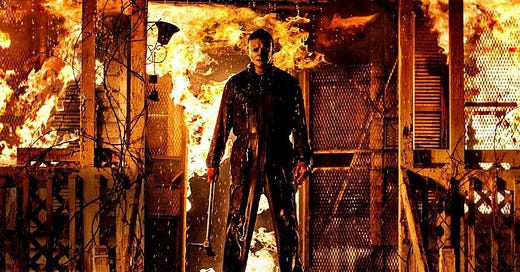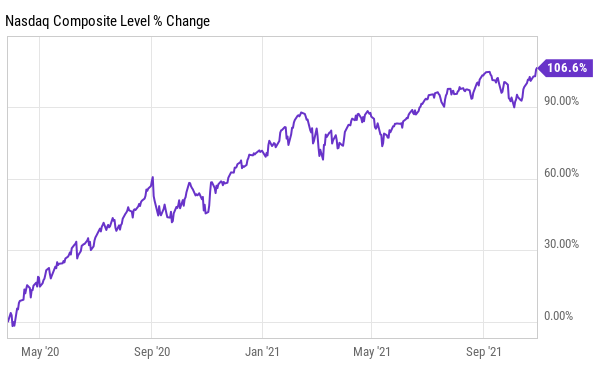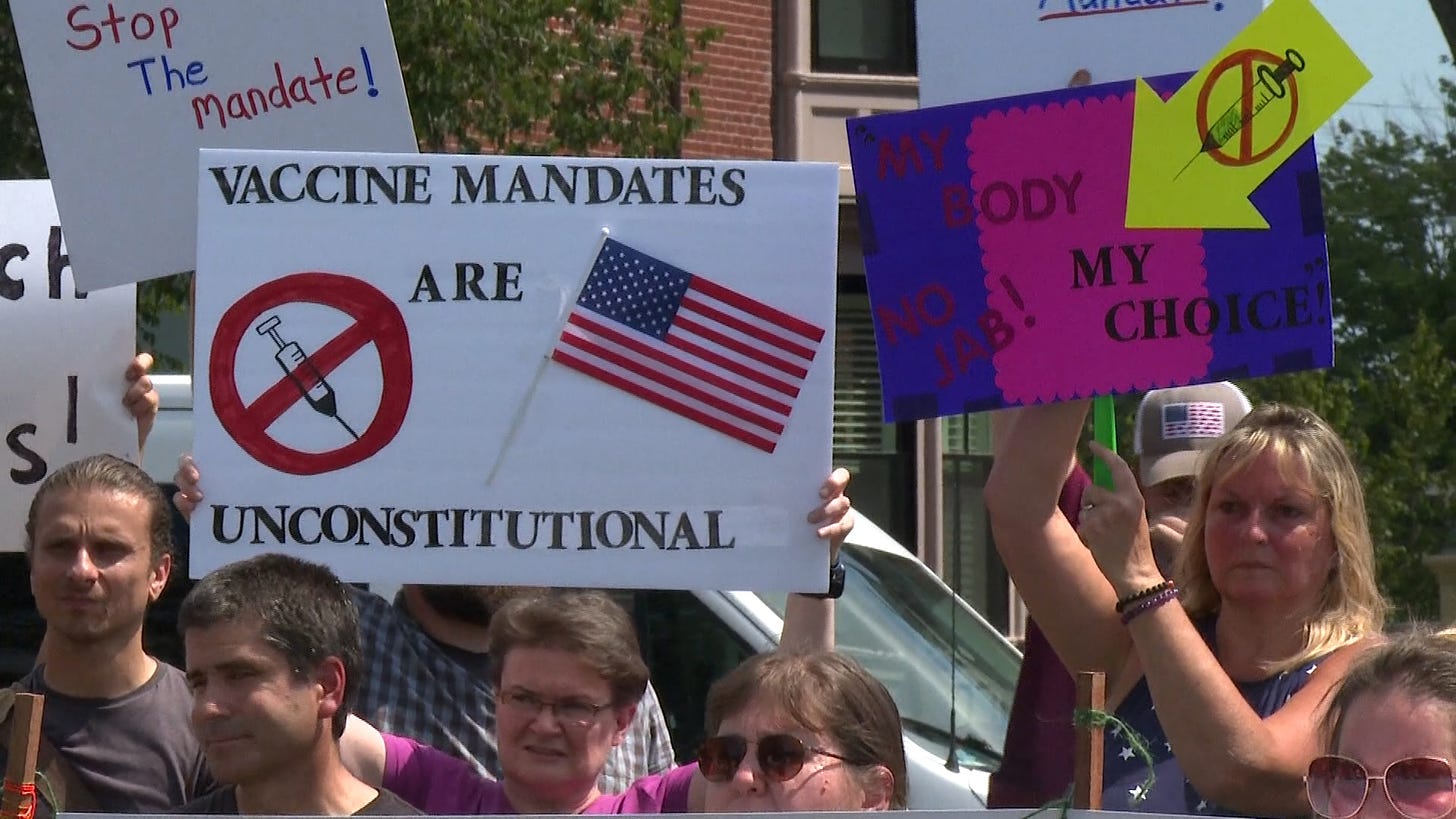Why We Could Be Staring Down The Barrel of A Catastrophic NASDAQ Crash And Not Even Know It
Covid. Gamma. Options. Is it any wonder we haven't noticed that we are teetering on the edge just yet?
It would certainly take a special confluence of factors for us to be staring down the barrel of a an unprecedented crash in tech stocks without noticing it’s coming. But I’m starting to entertain the idea that that is exactly where we are, we may not know how much pain we are truly in for - and we might not fathom how quickly it could come on and surprise us.
For a little while now my friend on Twitter @rosemontseneca has been quietly pontificating that we are living 1999 all over again, we just don't notice it yet. I'm starting to seriously agree with him and I have been thinking to myself over the past week: “Why aren’t other people making this comparison yet? Stocks are extremely overvalued. What’s ‘different this time’?”
Indeed, I believe the next crash is going to come as a breakneck-style surprise. If I had a chance to publish this piece before Halloween, I was going to make the analogy of somebody sneaking in the back door of the house and waiting around the corner in the kitchen to hack us to death when we went to make our “stoned-in-our-underwear at 2AM” bologna sandwich. But instead I wound up going with the gun analogy for the title because I was too lazy to get this article out in the month of October.
But analogies aside, the point is still the same: the next big market plunge could be any day now, and will likely be led by tech. Let me explain my reasoning.
A couple of things need to happen in order for a major crash to be around the corner without us knowing it, in my opinion. The first thing that needs to happen is that the bubble needs to be more dangerous than prior crashes - nobody would panic at the nominal size of the 1999 bubble anymore and it would hardly be enough to scare today’s investors. They’d probably look at it as a “dip” to buy. The second thing that needs to happen is we need to be flying totally blind and distracted to the market’s insane valuation somehow. This is where the “surprise” factor - also known as the “oh shit” moment - comes in. The third thing that needs to happen is a catalyst that will shock and wake everybody up all at once.
So let’s talk about why this bubble could be more dangerous than previous ones. The NASDAQ is literally the 1999 tech bubble on steroids. It’s not going to come as any surprise to my readers that I want to point out that a significant amount of call buying that was done purposely back in 2020 is what sets us apart from 1999’s market.
People are weaponizing options, something that wasn’t being done in 1999. In 1999, it was just plain hysteria that drove stocks higher. Between March 2020 and now, there have been multiple documented examples - Goldman Sachs, Softbank, Bill Hwang, whatever the fuck is going on in Tesla - that the NASDAQ may not have a real bid underneath it and may be may have started its pre-hysteria run at a much higher “foundational” level thanks to planned gamma squeezes.
This was from September 2020, on the Financial Times:
SoftBank is the “Nasdaq whale” that has bought billions of dollars’ worth of US equity derivatives in a series of trades that stoked the fevered rally in big tech stocks before a sharp pullback on Thursday and Friday, according to people familiar with the matter.
The Japanese conglomerate had been snapping up options in tech stocks during the past month in huge amounts, fuelling the largest ever trading volumes in contracts linked to individual companies, these people said. One banker described it as a “dangerous” bet.
This was also from September 2020, on Zerohedge:
According to IFR Reuters, the investment bank made about $100 million trading Tesla alone over the last several months. The bank was engaged in trades that included "stock options, providing financing secured against Tesla’s shares, and buying and selling its convertible bonds," according to Bloomberg.
This means that when we start to fall, a crash could wind up running into an air pocket where bids normally would be and accelerate quicker. It also means that we may have distorted the market for hire far quicker than any other time in history.
And, of course, there were massive option bets in highly shorted names like GSX and IQ that Bill Hwang owned, before his fund, Archegos, blew up.
The weaponization of options helped the NASDAQ double in nearly 18 months. This is not normal for an individual equity, let alone an index.
But if this run higher was 1999 all over again, many would argue that we would notice it. We would learn from our mistakes, right?
Of course, that statement is great for a laugh: we never learn from our mistakes.
So how could we not notice things getting out of control? Has there been anything that has distracted us lately?
Between the 2020 election, dealing with the pandemic and then investing the time necessary to sift through the mainstream media news to try and figure out which 5% of the narrative they are telling us is actually true, it’s no surprise we literally haven’t been able to pull our collective heads out of our asses.
Put simply: we really haven’t had time to give a shit about markets.
Do you remember years ago, when markets were about 50% lower than where they are now and Janet Yellen and Carl Icahn were sounding alarm bells? Yellen said that assets appeared overvalued while Fed Chair and Icahn put a video up on his website warning about valuations. That seems like ancient history now. And hey: if they thought the markets were grossly overvalued then, what do they think now?
That silence you hear is the sound of nobody speaking up anymore. It’s a combination of groupthink buy-in, overestimating the Fed’s grip on things and people being too distracted trying to figure out how we’re gonna deal with our new lives in the age of a pandemic.
Additionally, and especially when it comes to tech stocks, bullshit begets more bullshit. What I mean by this is that when asset managers are successful thanks to the tech stock market being in an uber-bubble, they need to come up with excuses for why they’re actually outperforming markets, even if they don’t have a clue how they’re doing it. Tune into CNBC on any given day and you’ll see this: it’s why we hear asset managers like Cathie Wood alluding to things like valuations not mattering anymore. This type of toxic bilge then becomes a self-fulfilling prophecy and leads more sheep to the slaughter…I mean NASDAQ.
Finally, we need a catalyst that will set the market off lower. The easy pick for catalyst is rates and tapering. The “outside” picks are things like crypto crashing or other catalysts we may not have even fathomed yet (think Evergrande, but with another larger, unexpected company). My readers know that I have talked extensively about crypto potentially becoming a pin that picks the bubble. You can listen to more of my argument about that here:
On top of my “fringe” theses, we also have high profile asset managers like Bill Ackman coming out and begging the Fed to taper and raise rates.
Inflation is starting to get to a point where it is becoming a major political issue and the rest of the country is starting to notice how quickly prices are rising. This is doing things like pulling demand forward, as consumers anticipate continued price hikes and supply chain issues.
These types of unnatural behaviors by the consumer, coupled with Wall Street realizing that a lack of action from the Fed could be catastrophic, could wind up being a perfect storm that catalyzes a deleveraging from growth stocks. If rates do begin to rise - even slightly - it will be a tiny incentive for a few investors to get out of the market and seek yield elsewhere. Even the slightest of rate moves and the slightest of tech market selling could catalyze massive aftershocks in equity markets - especially if it catches people bit by surprise and the aforementioned bid under tech stocks rests on the air pocket that I think it does.
The point of the matter is we could be closer to a tech stock crash than we think.
Finally, many people would probably hypothesize that we would never have two crashes in such a short period of time. After all, we just “got over” a crash in March 2020; ergo, people expect the bull market to go on for decades now. The average investor has forgotten that recessions and crashes don’t care when the last bull market was and don’t care when the last bear market was. We are fooling ourselves with cognitive dissonance when we tell ourselves that another crash isn’t possible because one just happened. An easy way to accept this fact is to realize we never truly “recovered” from the post-Covid rally - we simply papered over the problem.
And while this thesis of mine is relatively simple I ask you to consider these three things when you take a step back and try to objectively examine whether a crash could take place any day now:
Is this tech bubble larger and more dangerous than 1999?
Have we been distracted to the point where we may not have noticed how deep the water is that we are treading in?
Is there any lack of potential catalysts on the horizon for a market crash?
My answers to these questions point me right back to my title: we really could be staring down the barrel of the next crash.
I’d love to hear your thoughts in the comments:








In 1999 there were hardly any retail investors with margin accounts capable of participating in the options market, and even fewer that had accounts at the CBOE or CME for trading futures and other derivatives. The only ones that could take down large lots of options contracts were the long/short hedge funds and other large speculative companies involved in the Equities markets. Even institutional investors like insurance companies were hesitant to use derivatives at the time due to the lack of liquidity they would experience. A retail investor with a margin account was a rare observation in 1999, and the 2000 bubble pop delivered us something we have today that we didn't have then: The Pattern Day Trader rule and it's pre-requisite $25k account balance. Fast forward to now, this is a dramatically different environment.
We also, did not have a Federal Reserve that would even contemplate rescuing a bank or financial institution that bit off too much risk. That's why they're the FED and the banks were their customers. Add a few more financial crisis' to the mix after LTCM in 1998 and abracadabra: A Nonstop Two Decade Long and counting Keynesian Orgy commences. Monetary policy tools and the views of those managing it - are very different. In the Late 90's Japan's struggles were underway, but not nearly where they would wind up now, and nobody thought Japan was taking a prudent path forward. Most of us with brains still don't, but now we are not just sleeping in the same bed, we vertically integrated that bed and it's living in the Federal Reserve's board room.
Are we too distracted? Well, most of the money sitting in retirement accounts with BlackRock, StateStreet and Vanguard is 100% distracted unless they're about to retire... then they're terrified they don't have any easy way to reinvest those portfolios for producing income because we still don't have any meaningful or reliable yield in the fixed income markets. Never mind the fact that the lack of sound monetary theory will move the dollar to the basement and send government debt into the main septic line with it. That's just ONE distraction. Want a few more distractions? OK, you asked for it: Pandemic that comes seemingly out of nowhere, All world Governments reacting by following China's ideal approach to pandemic response. Once they found compliance amongst terrified populations, they doubled down and decided to take us to pound town with their new dreams of an authoritarian wet dream, and boy have they managed to do that. Some people are standing up, but the spread of government power centralizing globally has leaked its tentacles into every protected civil liberty we still have, and this obviously is a distraction as it starts to impact our children and every day to day life out there.
The potential catalysts are too numerous to list but a few I was able to think of:
a) China v Taiwan - if this happens, I don't think it would take much else to kick the ball down the mountain.
b) Russia cuts supply of energy to Europe as a show of political power.
c) Biden dies while in office, leaving our woefully inadequate VP to take the helm as our new fearless leader.
d) Off balance sheet credit risk - Bill Hwang 2.0 - Off B/S credit risk has popped many market bubbles so far in history that we can't bet against a tried and true winner like these guys. What dumbass bank has leant money to an irresponsible person who then dumps the loan into a speculative market hoping to become the next George Soros? We don't know, but we do know that no amount of regulation and government oversight has kept this from happening, and in fact might have caused encouragement in the past.
These are simple thoughts I am glad I have an outlet to share, because they keep me up at night for realz.
It's impossible to know what exactly is going to pop our bubble economy; but your point that we are "weaponizing" financial instruments like call options is great. I'm fifty years old and I lived through the Dot Com bubble and I don't remember call buying being a thing like it is today, at all. But, when you think about it, our entire economy has been "financialized" and CENTRALIZED to such a degree that it's become even more fragile than it was back then. I remember the "Maestro," Alan Greenspan, talking about irrational exuberance, etc., but I don't remember hearing from the Treasury Secretary ever other day; not to mention other Fed presidents. These central planners are the creators and also the cheerleaders of this financial edifice. My problem with all this is that central planning always seems to end badly. The Maestro didn't look so smart after the Dot Com bubble, did he?
Chris Meola